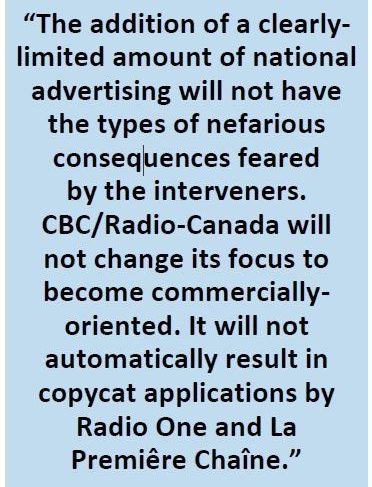
GATINEAU – Arguments from radio broadcasters that placing advertising on Radio 2 and Espace Musique will harm their businesses are wrong, CBC/Radio-Canada says in its licence renewal reply comments to the CRTC.
Small radio station owners and the radio council of the Canadian Association of Broadcasters (CAB) had argued in their inventions filed a few weeks ago that allowing national advertising on these two radio properties would result in decreased advertising revenue for commercial operators. They also warned of the slippery slope where CBC would have to cater to its advertisers and begin playing more mainstream music.
The public broadcaster discounted all of those arguments. First, it says the possibility of siphoning off advertising revenue from the small players is untrue based on its advertising sales projections. CBC notes that the amount of ad revenue it projects to generate is less than historical annual growth levels for national radio advertising. “It can be seen that what we have proposed is sensible and realistic. It will not prevent Canada’s private commercial broadcasters from fulfilling their regulatory obligations as well as their corporate and market objectives,” says the CBC in its reply.
The corporation projects revenue would be $35 million annually by the seventh year of its licence term, out of total radio advertising pie of $1.6 billion (2.2%). “Spread across Canada, it is not possible to reasonably draw a line from the limited proposal presented here to the dire negative consequences that the CAB Radio Council has presented to the commission,” it argues.
The potential for moving Radio 2/Espace Musique towards a more mainstream style is another suggestion CBC disputes. Rather, the public broadcaster is interested in selling advertising to those companies who want to reach the Radio 2 and Espace Musique audiences and “does not intend to re-orient its programming at the behest of its future advertisers,” reads its reply.
“CBC/Radio-Canada understands the concerns of interveners, but feels they are exaggerated,” it continues. “The addition of a clearly-limited amount of national advertising will not have the types of nefarious consequences feared by the interveners. CBC/Radio-Canada will not change its focus to become commercially-oriented. It will not automatically result in copycat applications by Radio One and La Premiêre Chaîne.”
CBC’s proposal for a signal compensation regime also raised the ire of many. The Corporation argues that if the private broadcasters are allowed to operate in such a regime, then it should too. The public broadcaster acknowledges that this type of regime has still yet to be decided upon (the Supreme Court of Canada is mulling it right now), but says if the CRTC does indeed have the authority to implement such a model, then it only stands to reason CBC should be allowed to participate as well.

“While the implementation mechanism may differ in order to ensure that no CBC/Radio-Canada signal is deleted from any customer’s basic service, the underlying principle should not. Some form of compensation from the BDUs is appropriate and fair,” says CBC.
The corporation also disputed claims from the broadcast distribution undertakings (BDUs) that they aren’t free riding on the CBC’s content. The cable, satellite and telco TV service providers are acting as the “middleman” who takes profits away the person who makes a product, the public broadcaster says. “That is what the BDUs are doing with respect to the corporation's conventional television services – they are selling those services to their subscribers and keeping all the money for themselves. Basic principles of fairness suggest that some sharing of those monies is appropriate.”
CBC also used its reply to dispel some myths that it isn’t doing enough for minority language programming. It highlighted the level of French-language programming outside of Quebec as an example where Radio-Canada regional stations have produced 34 episodes of the series Tout le monde en parlait, which includes 19 by its minority-language stations. CBC adds that production centres in minority-language communities make an average of six to 11 hours of local programming each week.
The Corporation also recognizes that independent producers would like to get more work from the CBC, but says it already sources a considerable amount of programming from them. It says the 75% level of programming from indie producers is appropriate and besides, “a broader quota for independent production in the regions would be especially problematic. Stripping from the Corporation the flexibility to choose which programs it wishes to develop and broadcast on the basis of quality, diversity and audience appeal would substantially impair its ability to fulfill its mandate.”
The CBC argues a more flexible regulatory environment would be better, despite calls for “old style approach of management through dozens of conditions of licence, expectations and encouragements.” Micromanagement is neither necessary nor efficient, it argues.
“In the current environment it makes no sense to impose rigid quotas for specific categories of content on specific licensed services when the most effective way to provide that content to the desired audience may change,” says CBC. “If anything, a micro-management approach is even less appropriate for the corporation than for private broadcasters. If it is appropriate to adopt a more flexible regulatory regime for the private sector, then this makes all the more sense for the corporation, in order that it pursue innovative ways to fulfill its mandate and serve Canadians.”
The hearing gets under way November 19th.


